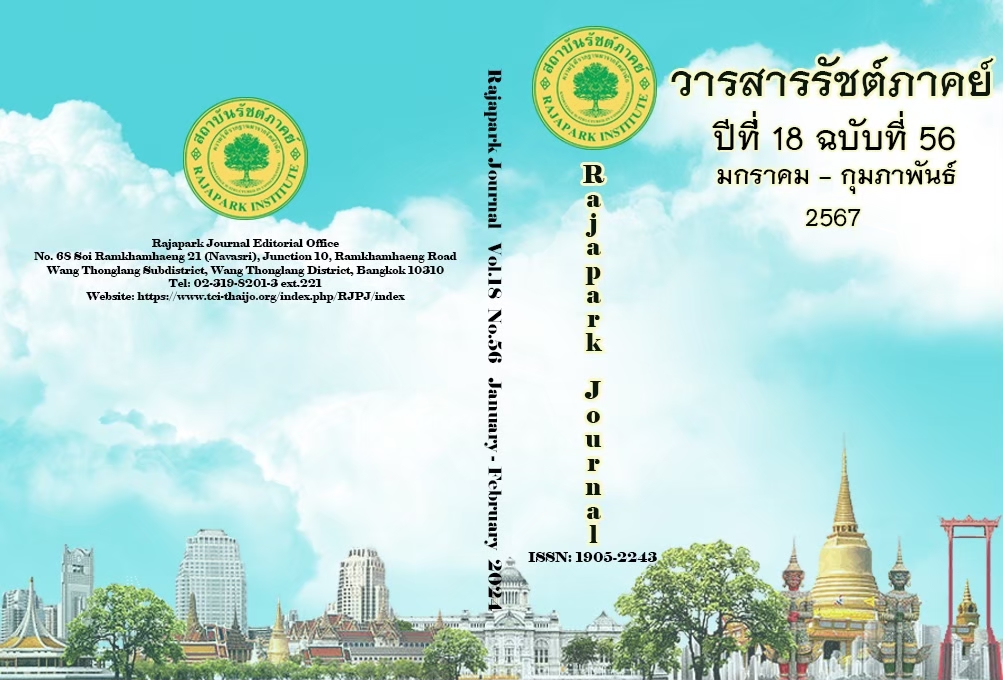Security in the Criminal Justice System: A Case of Criminal Record Deletion
Main Article Content
Abstract
The academic article aimed at bringing security into the criminal justice system should be explicitly legislated to protect human rights, including groups of people who have been recorded. Case: people are alleged offenders, suspended sentence offenders, prisoners who were purged depending on the act, and juvenile delinquents. Because the Constitution of the Kingdom of Thailand B.E. 2017 postulates a warranty for protecting human rights in the criminal justice system, One of the most important is the right to protection for offenders. Nowadays, Thailand only regulates offenders, data collection, and sorting data from a directory or criminal records database. Deletion or concealment is not included in the regulation mentioned earlier. This means that these kinds of people still have data in the criminal records database of the Royal Thai Police. Having a criminal record makes society stigmatize them as bad guys, and it also has some negative attitudes. This has an impact on a lack of education opportunities, career paths, or living a happy life in society.
Article Details

This work is licensed under a Creative Commons Attribution-NonCommercial-NoDerivatives 4.0 International License.
Views and opinions appearing in the Journal it is the responsibility of the author of the article, and does not constitute the view and responsibility of the editorial team.
References
Behavior Development Division, Department of Corrections, Ministry of Justice, Thailand. (n.d.). Criminals and the Labeling Theory. http://br.correct.go.th/br_wp/?p=24
Convention on the Rights of the Child. Retrieved from https://humanrights.mfa.go.th/upload/pdf/crct.pdf
Kittiyarak, K. (2002). Thinking Platform for Thai Criminal Justice Reform Project: Strategy Reforming the Thai Criminal Justice System (3rd ed.). The Thailand Research Fund (TRF).
Pisitpunporn, J. (2011). Enforcing Pattern, Process and Policy of Expunction of Criminal Records for Criminal Justice Process in Thailand[Master’s thesis, Chulalongkorn University].
Pongseang, K. (2022). Criminal Record Deletion Problem[Master’s thesis, Dhurakij Pundit University].
Poonsanong, S. (2000). Amnesty in Thailand[Master’s thesis, Thammasat University].
Suwannamai, J. (2021). The Criminal Record of a Child or Youth Convicted of Offense and Special Measures in Lieu of Criminal Proceeding[Master’s thesis, Dhurakij Pundit University]. https://libdoc.dpu.ac.th/thesis/Jakgrin.Suw.pdf
Sangsasithorn, K. (1990). Criminal Defendants’ Sentencing Process: Comparison of Thailand Foreign Countries[Master’s thesis, Thammasat University].
Silarat, N., & Boonsathorn, W. (2019). Factors and Benefit for Organizations in Hiring Former Convicts to Work in Organizations. Human Resource and Organization Development Journal, 11(2), 90-115. https://so01.tci-thaijo.org/index.php/HRODJ/article/view/152158
Tonglubluang, P. (2020). Legal Problems Regarding the Erasure of Criminal Records in Order to Rehabilitate the Behavior of Offenders. Faculty of Law, Ramkhamhaeng University. http://www.lawgrad.ru.ac.th/Abstracts/983
Thairath online. (2023, June 28). Minus 13.7 million The Record of Acquittal of “Criminals” Focuses Only on Prosecutors, Not Prosecutions, The Court Dismissed the Case. https://www.thairath.co.th/news/local/2705186
Uppananchai, S. (2011). Restrictions on the Rights of those Who have been Exonerated for Criminal or Disciplinary Actions[Master’s thesis, Mae Fah Luang University].


